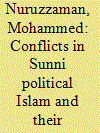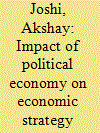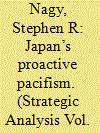|
|
|
Sort Order |
|
|
|
Items / Page
|
|
|
|
|
|
|
| Srl | Item |
| 1 |
ID:
152651


|
|
|
|
|
| Summary/Abstract |
The article assesses China’s Indian Ocean strategy against the backdrop of its naval base development in Djibouti. It argues that China’s naval force posturing stems from a doctrinal shift to ocean-centric strategic thinking and is indicative of the larger gameplan of having a permanent naval presence in the Indian Ocean. China’s maritime strategy comprises four key components. First, to channel naval reinforcements for securing its maritime trade and economic interests in the Indian Ocean Region (IOR)—even as it strengthens the Maritime Silk Road initiative. Second, to develop logistical and operational capacities for a permanent far-seas presence, including preparedness for maritime combat and non-combat operations. Third, to undermine India’s geo-strategic influence in the IOR as the two lock into a near zero-sum game maritime competition. Fourth, to overcome the threat of US naval dominance and deter its coercive tactics by enhancing the costs of military conflict. Beijing’s ultimate objective is to emerge as a ‘global maritime power’ capable of commanding the far seas and oceans.
|
|
|
|
|
|
|
|
|
|
|
|
|
|
|
|
| 2 |
ID:
152658


|
|
|
|
|
| Summary/Abstract |
Traditionally, the Shi’a–Sunni divide and the associated dynamics of the geopolitical struggle for power and dominance, between the minority Shi’as and the majority Sunnis, have defined intra-Islamic relations. Often sidelined were the political differences between and among groups and movements within Shi’a as well as Sunni Islam. This essay seeks to examine the ideological and political conflicts between the two dominant brands of Sunni political Islam—the conservative Islamists led by Saudi Arabia and the militant Islamists who grouped first under the banner of al-Qaeda and later the Islamic State. It briefly traces the origins of both brands of Sunni political Islam, maps out their goals and strategies, and highlights their implications for the Middle East region and the West at large.
|
|
|
|
|
|
|
|
|
|
|
|
|
|
|
|
| 3 |
ID:
152654


|
|
|
|
|
| Summary/Abstract |
What has been the impact of Political Economy and ideational factors such as formative experiences of a State, ideas of strategic thinkers and history on the strategic economic choices made by nation-states? While many authors have used the political economy framework to analyse global and domestic change, it is surprising that not many scholars have adequately explored the impact of political economy and ideational factors on economic strategy making in the Indian context. This article seeks to build on existing research by studying the interaction between political, social, historical, economic and ideational factors to explain India’s economic strategy making in the post-independence period until the 1991 reforms. The article looks at some of the key ‘turning points’ in India’s economic development post-independence (1947–1991) and examines how India’s economic strategies were impacted by a combination of political, economic, social and ideational factors as well as the constant interaction between the domestic and international environments. In doing so, the article seeks to understand the complexity of India’s economic development and to explain why India’s policy-making community took the strategic economic decisions that it took.
|
|
|
|
|
|
|
|
|
|
|
|
|
|
|
|
| 4 |
ID:
152655


|
|
|
|
|
| Summary/Abstract |
The United Nations (UN) adopted UN Peacekeeping, during its initial years, to restore international peace and security. As the world body celebrated 70 years of its existence in 2015, UN Peacekeeping continues to play an important role in maintaining peace and security, by protecting civilians and preventing human rights violations arising from violence and conflict. India has emerged as one of the frontrunners in the shared responsibility of ushering in peace and stability in the world, under the umbrella of the UN. It has adhered to UN principles and has shouldered the responsibility of providing troops, financial assistance and other requirements necessary to bring about peace. But of late, India has lamented that the UN Security Council is not heeding, and sidesteps, the voice of the contributing countries in the planning and administering of peacekeeping missions. Thus, the basic objective of this article is to examine India’s stance on peacekeeping in the wake of growing clamour to allow contributing countries a role in decision-making. It also analyses the rationale behind India’s renewed commitment towards UN peacekeeping in current times.
|
|
|
|
|
|
|
|
|
|
|
|
|
|
|
|
| 5 |
ID:
152652


|
|
|
|
|
| Summary/Abstract |
Since 2012, Japan’s foreign policy under Prime Minister (PM) Abe has been characterized as assertive, welcome or provocative. By employing the fear of abandonment/entrapment theory as the analytical framework, this article finds that Japan’s regional foreign policy under Abe is characterized by consolidation and investment in broad-based multilateralism, proactive engagement with partners in the region, including China, and strategic hedging. Findings suggest that the current foreign policy under the rubric of ‘proactive pacifism’ will continue to expand as Japan endeavours to consolidate and invest in multilateralism and rule-based norms through regional trade agreements, and by playing a proactive role in international organizations and regional security operations that abide by Japan’s constitutional limitations.
|
|
|
|
|
|
|
|
|
|
|
|
|
|
|
|
| 6 |
ID:
152656


|
|
|
|
|
| Summary/Abstract |
The Republic of Kazakhstan seeks to undergo modernization over the course of the next several decades and transform into one of the world’s top 30 economies. To fulfil this aim, the Kazakhstani government has designed a programme known as the ‘100 Steps’. If faithfully implemented, this package of reforms will gradually revolutionize the nature of Kazakhstani state–society relations, by remaking Kazakhstan into a more economically dynamic and politically pluralistic country. However, a series of bureaucratic-legal, economic, and socio-political challenges will need to be overcome in order for this to happen, and success or failure will ultimately be determined by the actions of the ruling elites.
|
|
|
|
|
|
|
|
|
|
|
|
|
|
|
|
|
|
|
|
|